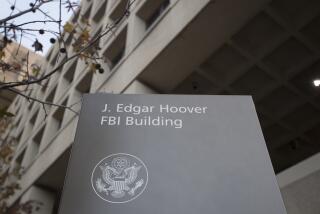68 indicted in bust of Peckerwoods white supremacist gang in San Fernando Valley

- Share via
Federal prosecutors on Wednesday indicted 68 alleged members and affiliates of the Peckerwoods, claiming the white supremacist gang sold drugs and committed fraud in the San Fernando Valley under the auspices of imprisoned members of the Aryan Brotherhood.
1

2

1. The letters SFV for the Peckerwoods gang signify “San Fernando Valley” and the acronym of “Searching for Victims,” federal prosecutors allege. (U.S. Attorney’s Office, Central District of California) 2. Federal prosecutors included a picture of an alleged Peckerwoods gang member holding firearm in a sweeping indictment announced Wednesday. (U.S. Attorney’s Office, Central District of California)
Twelve alleged Peckerwood members are charged with racketeering, while another 56 defendants are charged with conspiring to distribute drugs.
The Peckerwoods, who took their name from a derogatory term for white inmates in the California prison system, embraced Nazi iconography and traded racist comments in a private Facebook group, according to an indictment unsealed Wednesday.
Ralph Rocha was a suspect in the death of Lucio Rodarte, whose body was found in an alley, blindfolded, gagged and handcuffed. Then Rocha became an informant for the ATF.
During the height of the protests following the killing of George Floyd in 2020, the indictment says, one member of the Facebook group wrote: “I wish all the blacks and all the cops would just kill ALL of each other. Our side of the dayroom only! If thats all that was left in the world, that would be awesome.”

But according to the indictment, the Peckerwoods’ primary concern was making money — through selling methamphetamine, heroin and fentanyl, prosecutors say. They are also accused of more sophisticated crimes like identity theft and bank fraud, and some Peckerwoods robbed drug dealers and stole merchandise in “smash-and-grab” heists, the indictment says.
Collecting a “tax,” or cut of the proceeds, prosecutors allege, were members of the Aryan Brotherhood, the dominant white gang in the California prison system. Two alleged Aryan Brotherhood members were charged in the indictment: Paul John Pichie, a.k.a. “Sinister,” and Michael “Suspect” Vitanza, who are both accused of conspiring to traffic drugs.
Vitanza once shared a prison cell with Danny Troxell, described at a recent racketeering trial as a member of the Aryan Brotherhood’s three-man ruling “commission.” A witness at the trial testified that Vitanza was “Danny T’s right-hand man.”
In a call secretly recorded by authorities, Vitanza allegedly told a female associate he was the “youngest made member of the Aryan Brotherhood.”
“The Peckerwoods’ violent white-supremacist ideology and wide-ranging criminal activity pose a grave menace to our community,” U.S. Atty. Martín Estrada said in a statement. “By allegedly engaging in everything from drug-trafficking to firearms offenses to identity theft to COVID fraud, and through their alliance with a neo-Nazi prison gang, the Peckerwoods are a destructive force.”
A young couple targeted four cannabis dispensaries for robberies during a six-week-long spree, prosecutors say. Detectives titled the case file “Romeo and Juliet.”
The indictment makes clear that Vitanza and other defendants were communicating with prisoners using contraband cellphones. The indictment lists dozens of unnamed conspirators who were not charged.
The case against the Peckerwoods follows similar racketeering indictments brought against the Aryan Brotherhood in Sacramento and Fresno. In those cases, authorities have accused imprisoned leaders of the organization with orchestrating murders both inside and outside the California prison system.
Prosecutors this year convinced a jury to convict Troxell and two co-defendants of murder in aid of racketeering. But their stated goal of transferring the defendants, who were already serving life sentences in state custody, to more restrictive federal prisons has stalled following the federal Bureau of Prisons’ refusal to accept the California inmates.
One Aryan Brotherhood member who pleaded guilty to murder in aid of racketeering in that case is now trying to withdraw his plea, saying he signed it only because he’d been assured he’d spend the rest of his life in a federal — not California — prison.
More to Read
Sign up for Essential California
The most important California stories and recommendations in your inbox every morning.
You may occasionally receive promotional content from the Los Angeles Times.











